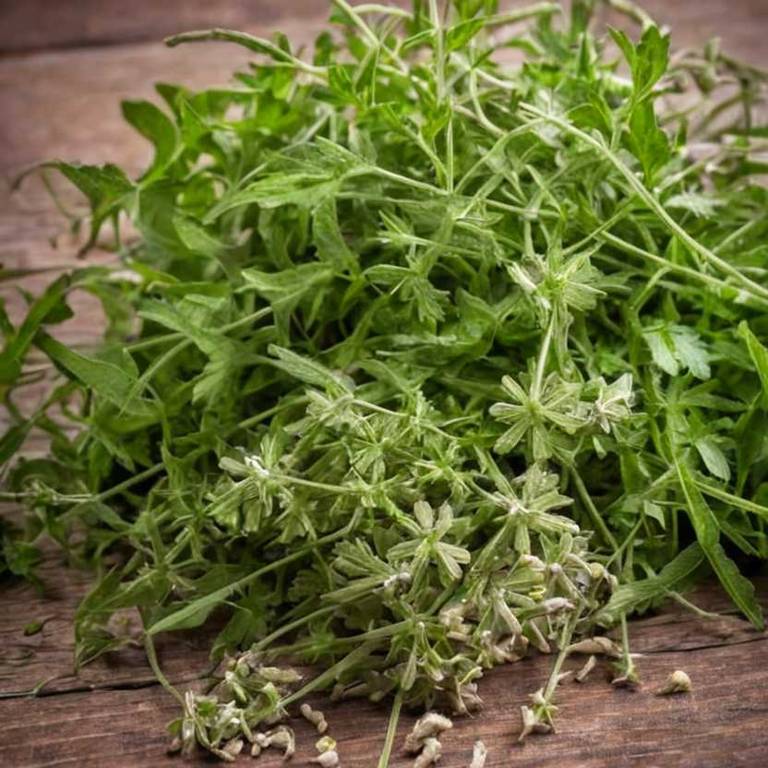Verbenas (Verbena officinalis)
Verbenas (Verbena officinalis) is a member of the Verbenaceae family, native to Europe, North Africa, and Asia. Traditionally, its leaves, flowers, and stems have been used for infusions, decoctions, and poultices.
This herb is particularly valued for its bitter, anti-inflammatory, and carminative actions, and has a long history of use in european herbal medicine, mediterranean herbal traditions, and native american herbal medicine.

Quick Facts / Key Information
| Common Name | Verbenas |
|---|---|
| Scientific Name | Verbena officinalis |
| Plant Family | Verbenaceae |
| Genus | Verbena |
| Species | officinalis |
| Native Range | Europe, North Africa, Asia |
| Plant Parts Used | Leaves, Flowers, Stems |
| Primary Medicinal Actions | Bitter, Anti-Inflammatory, Carminative |
| Primary Traditional Systems | European Herbal Medicine, Mediterranean Herbal Traditions, Native American Herbal Medicine |
| Historical Preparation Methods | Infusion, Decoction, Poultice |
Botanical Identity
- Scientific Name
- Verbena officinalis
- Common Name
- Verbenas
- Synonyms / Alternative Names
- Common Verbena, Redstem Verbena, Redstem Verbena
- Plant Family
- Verbenaceae
- Genus
- Verbena
Botanical Description
- Growth Habit
- Perennial herbaceous plant.
- Height
- It typically grows to a height of 30 to 100 centimeters.
- Leaves
- Smooth upper surface with prominent stomatal bands, lower surface glabrous and lighter in color, leaf type broad and ovate.
- Flowers
- Flowers are blue to violet in color, arranged in dense spikes, actinomorphic, with five petals and five stamens, featuring prominent white veins on the petals.
- Stems
- Cylindrical, erect, branching in pairs, surface glabrous, nodes prominently swollen, internodes distinct, hollow inside, with a fibrous sheath at the base of each leaf.
Traditional Uses / Historical Use
Traditional Systems
- European Herbal Medicine
- Mediterranean Herbal Traditions
Historical Preparation Methods
- Infusion
- Decoction
- Poultice
- Oil Infusion
Medicinal Actions
- Bitter
- Traditionally described as a soothing bitter, for digestion-related formulations.
- Anti-inflammatory
- In herbal texts, considered a moderate anti-inflammatory, in tissue-soothing contexts.
- Carminative
- In herbal literature, noted as a warming carminative, in stomach-related herbal uses.
- Tonic
- Historically regarded as a calming tonic, in whole-system applications.
Active Compounds
- Flavonoid
- A group of naturally occurring compounds commonly present in many flowering plants.
- Coumarin
- Organic compounds biosynthesized as part of plant secondary metabolism.
- Terpenoid
- Naturally occurring metabolites widely distributed in leaves, flowers, and roots.
- Essential Oil
- A collective term for aromatic compounds extracted from plant material.
Modern Research Overview
Contemporary research on this plant includes areas such as chemical analysis, laboratory-based studies, and observational research. Detailed summaries of published findings are not included at this stage and will be added during future content updates.
Safety & Contraindications
- General Precautions
- The use of this herb may warrant general caution in certain situations.
- Contraindications
- Reports outlining specific contraindications for this herb are limited.
- Allergies
- Information regarding allergic responses to this herb is limited.
- Drug Interactions
- Interactions with prescription medications have not been well documented.
- Toxicity
- The toxicity profile of this herb has not been clearly established.
- Pregnancy & Breastfeeding
- Use during pregnancy or breastfeeding has not been clearly established in available sources.
Preparation & Usage Methods
- Infusion
- Infusions are commonly prepared using hot water to release aromatic and soluble components.
- Decoction
- This method uses sustained heat to extract compounds from firm plant structures.
- Poultice
- This method uses direct contact between plant material and the skin.
- Tincture
- This method preserves plant compounds using an alcohol-based solution.
- Infused Oil
- Oils are infused with plant material over time to absorb constituents.
Growing, Harvesting & Storage
Growing / Cultivation
- Soil
- Prefers loamy soil with well-drained conditions. Typically grows best in organically rich soils.
- Sunlight
- Thrives in full sun. Tolerates full sun to partial shade.
- Watering
- Prefers well-balanced moisture levels. Tolerates periodic dry conditions.
Medical Disclaimer
The information provided on this page is for educational and informational purposes only. It is not intended to diagnose, treat, cure, or prevent any medical condition. Always consult a qualified healthcare professional before using any herb for medicinal purposes.